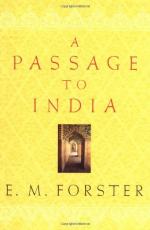|
|
A Passage to India Author/Context
Edward Morgan Forster was born on January 1, 1879 in London. Forster's father, an architect, died a year later in 1880 from consumption. He was 33 years old. As a result of this death, Forster was raised in a female-dominated household. He and his mother, Alice Whichelo, were so close that he lived with her until her death in 1945. He was also raised in part by his maternal grandmother and his paternal great aunt, Marianne Thornton, a wealthy woman who showered her nephew with gifts. Forster's novels, including A Passage to India, feature positive portrayals of women as a result of his childhood influences.
Forster was educated at the elite Tonbridge School in Kent. He felt stifled in this educational atmosphere. At this school, which appeared as Sawston in his other novels, Where Angels Fear to Tread and The Longest Journey, he devised the theme of the "undeveloped heart." He blamed the public school system for many of the faults of the British middle class. While the development of mind and body were encouraged at school, no one paid attention to the development of the heart and emotions. His character, Ronny Heaslop, is a true product of Britain's public school system. He is a source of officialism without emotion.
In 1897, Forster began his studies at King's College, Cambridge, where he felt a sense of intellectual liberation. After Cambridge, Forster decided to pursue a life of writing. Following the end of his studies, Forster traveled in the Mediterranean for much of 1901 and 1902. He discovered Europe beyond the familiar conventions of England. Forster found Greek paganism and the Italian Renaissance particularly interesting.
In 1903, his friends from Cambridge founded a liberal newspaper called The Independent Review, which combated aggressive imperialism and promoted left wing politics. Forster began to contribute to this publication and his association with this politically elite group influenced his writing.
Forster's early works reflect the trend of turn-of-the-century British writers to diverge from Victorianism. His writing was more colloquial and less formal. Forster became adept at portraying the lives of the middle class. He also became interested in observing the insular lives of the English middle class abroad.
In 1912, Forster made the first of his two trips to India. His trip lasted six months and provided him the inspiration for writing A Passage to India. Orientalism inspired him in his adulthood the way Italian renaissance and Greek paganism inspired him as a youth. In India, he visited a Muslim friend whom he met in England as well as a friend from Cambridge. The Muslim friend was the inspiration for the character Dr. Aziz. During this visit, he also traveled to Bankipore in the Bengal region (the basis of Chandrapore that is featured in the book) and the nearby Barabar caves. It was in these six months that Forster wrote the first seven chapters of Passage that led up to the picnic outing at the Marabar caves.
During the years of World War I (from late 1915 to early 1919) Forster spent most of his time in Alexandria, Egypt as a search officer for the Red Cross. In 1921, Forster revisited India and served for six months as the private secretary to the maharajah of Dewas Senior. This served as his inspiration for the final half of the novel. Passage was the last piece of fiction that Forster wrote. Afterwards, Forster published a documentary account of his trip to India and guides to Alexandria. Queen Elizabeth II awarded Forster with membership in the Order of Companions of Honour in 1953, and on January 1, 1969 (his ninetieth birthday), he received the Order of Merit. He suffered a series of strokes toward the end of his life. He died on June 7, 1970 in Coventry.
Bibliography
Forster, E.M. A Passage to India. San Diego: Harcourt Brace Jovanovich, Inc., 1924.
Scott-Kilvert, Ian. British Writers, vol.VI. New York: Charles Scribner's Sons, 1983.
Stone, Wilfred. The Cave and the Mountain. Stanford: Stanford University Press, 1966.
Trilling, Lionel. E.M. Forster. New York: New Directions, 1943.




